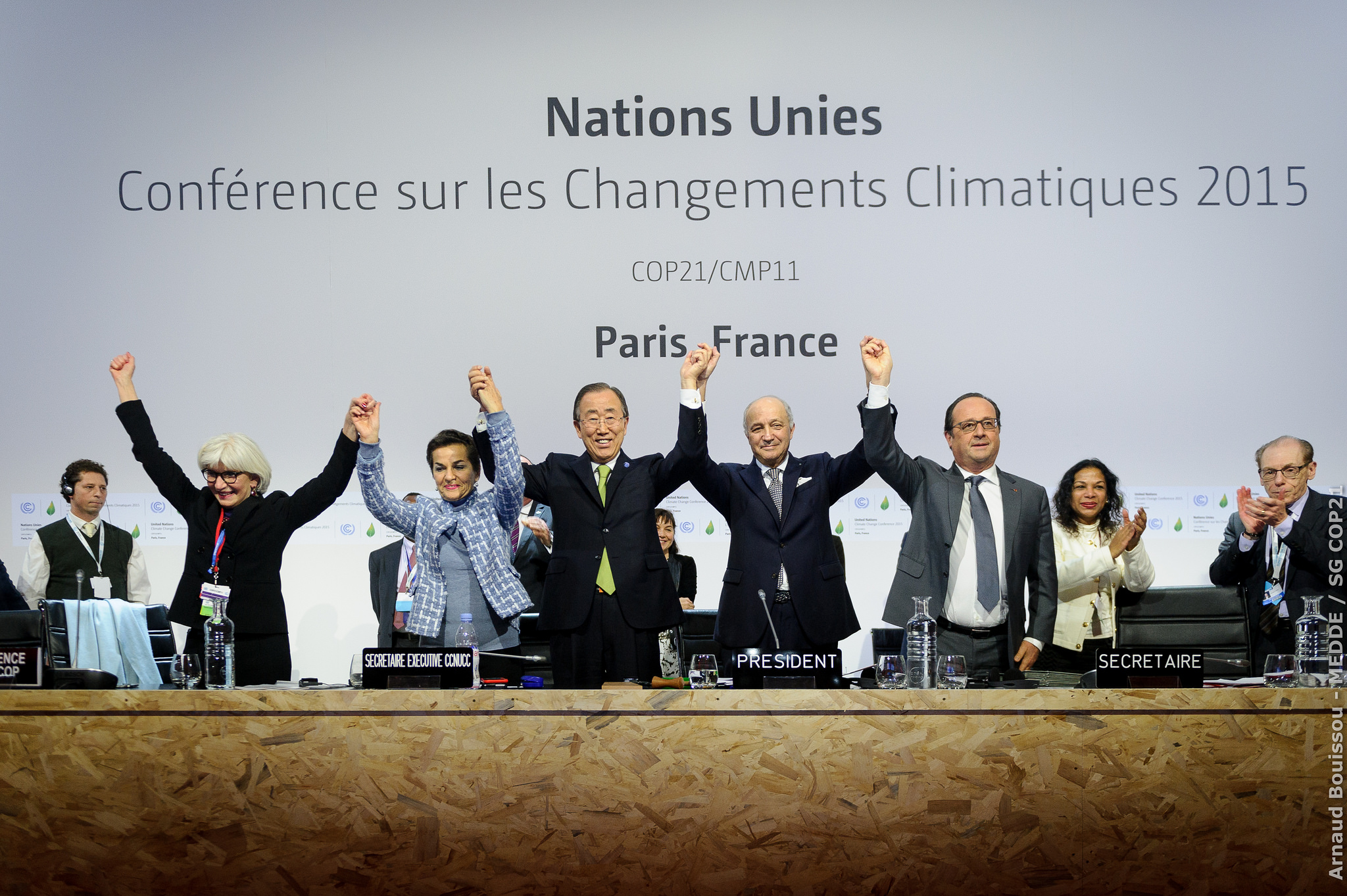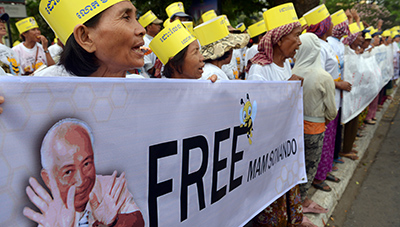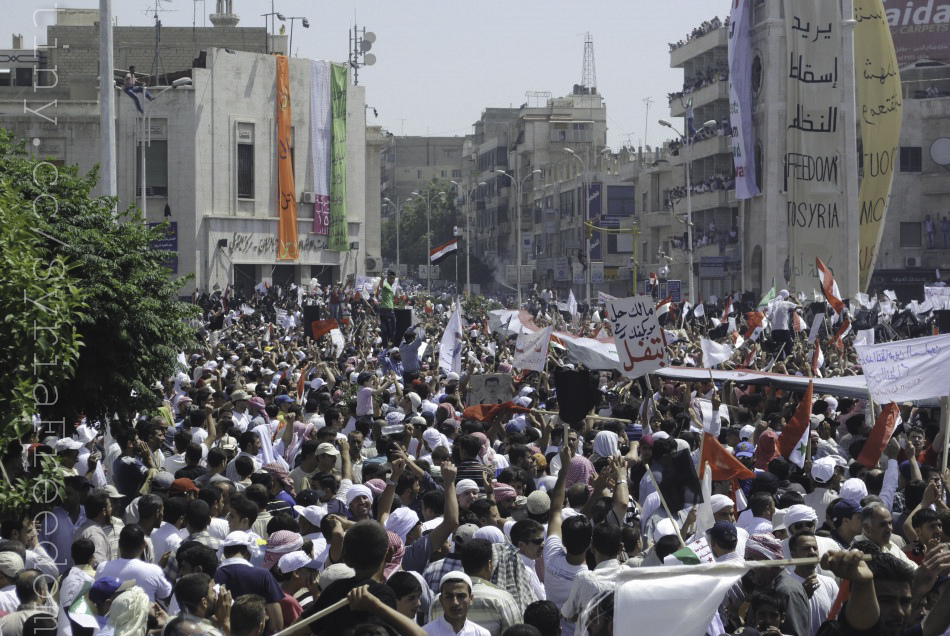The 21st Conference of the Parties to the United Nations Framework Convention on Climate Change (UNFCCC) took place from November 30 to December 11, 2015 in Paris, France.[1] More than 150 nations submitted Intended Nationally Determined Contributions (INDCs) outlining plans for decreased carbon emissions and increased energy efficiency.[2] The goal of this conference was to create a “Paris Climate Alliance,” an agreement that would limit global warming to less than two degrees Celsius above pre-industrial levels. The agreement aimed to be universal and agreed to by all participating nations. This required cooperation, sacrifice, and compromise from all nations, especially larger, industrialized states who will need to give support to smaller, underdeveloped ones. The conference had the possibility of concluding with nonbinding minimal guidelines and suggestions or stimulating substantial changes to protect the environment.
The result was The Paris Agreement, a binding legal document, and the Paris decision, a non-binding list of goals and strategies.[3] Together, these documents addressed six key issues regarding climate change. First, the agreement set a 2 degree Celsius warming limit but had a goal of staying below 1.5 degrees. Second, it was agreed that peak carbon emissions should be reached, with a goal of net-zero emissions by 2050. Third, it was agreed that more than $100 billion will be needed to finance climate action, but a binding agreement was not finalized. Fourth, an agreement was made regarding the frequency and method of checking carbon emissions. Fifth, it was decided that there will not be an outside agency overseeing whether nations follow their pledges, but a common framework of transparency will be put in place. Finally, the Paris Agreement included a list of ways that developed nations could assist climate-threatened developing nations, but it placed no liability or binding responsibility on countries.
The Paris Agreement is just one of many UN climate agreements already in place. The UNFCCC was created at the Earth Summit in Rio de Janeiro in 1992.[4] During this first conference, it was acknowledged that anthropogenic climate change poses an imminent global threat, and industrialized nations must take responsibility to fight it. The Kyoto Protocol, proposed at this summit and enforced in 2005, aimed to set limits on greenhouse gas emissions for industrialized nations.[5] Following the Earth Summit, the first UN Climate Change Conference was held in Berlin in 1995 and has been held yearly since. These annual gatherings show that climate change is recognized globally and cannot be settled in isolation from other states. World leaders have agreed that changes need to be made and that every member must contribute. However, the extent of these changes as well as the differences in responsibilities for larger, industrialized nations are not universally agreed upon, and cause substantial delay and lack of action. While the Paris Agreement has the potential to stimulate change, it is at risk of disunity and unwillingness to cooperate among world leaders and will need to be continuously fought for and made a priority.
At the COP15 in 2009, the Copenhagen Accord emphasized the multilateral responsibility of keeping global average temperature increases to no more than two degrees Celsius above pre-industrial levels.[6] Recently, the climate conferences in Warsaw in 2013 and Lima in 2014 allowed the nations participating in the COP21 in Paris in 2015 to submit Intended Nationally Determined Contributions, individualized goals for each nation based on their abilities to cut emissions, with the purpose of reducing greenhouse gas emissions.[7] Although these conferences are held yearly and agreements are made, many of these agreements are nonbinding and do not make enough of an impact. The Copenhagen Accord, for example, is not legally binding and does not force any member to accept a new agreement after the expiration of the Kyoto Protocol.[8] Post-conference analysis called the conference “an abject failure” and declared that “well-meant but half-hearted pledges to protect our planet from dangerous climate change are simply not sufficient to address a crisis that calls for completely new ways of collaboration across rich and poor countries.”[9] The entire purpose of the 2014 Climate Summit in Lima was to prepare for the COP21 in 2015. By failing to take significant action and pushing back deadlines farther and farther, world leaders are increasing the threat of climate change for everyone.
Despite the work of these conferences, 10 of the warmest years have occurred in the last 12 years.[10] The global average temperature has already increased one degree Celsius, and in the summer of 2012, over half of the Arctic Sea ice disappeared.[11] These climate changes will affect the entire globe, causing higher sea levels, frequent natural disasters of higher intensity, and changes in temperatures and climates that will affect agriculture and ecosystems. In the words of Tony de Brum, foreign minister of the Marshall Islands, “Anything over a two degree [increase in global temperatures] is the end of our country; we go underwater when that happens.”[12] COP21 was seen as a last chance for leaders to take action. Any further delays could cause irreversible damage to the climate.
Citizens around the world are calling on world leaders to take action. Through protests, gatherings, and raising awareness, people are showing leaders that this problem cannot be ignored. The People’s Climate March held in NYC in September 2014 had more than 400,000 protestors, with hundreds of thousands of sister actions in over 160 countries. These protests were in preparation for the COP21, showing world leaders the undeniable threat that climate change poses and demanding that action be taken at the leadership level. Even Pope Francis has commented on the urgency of combating climate change, stating, “Our common home is being pillaged, laid waste and harmed with impunity. Cowardice in defending it is a grave sin.”[13]
This conference produced the Paris Agreement and the Paris Decision, which have the potential to create huge developments towards lower carbon emissions and a sustainable, cleaner future. Rather than delaying action and making insignificant commitments, world leaders need to step up and take responsibility for the security and future of the planet and follow through with the goals that were created. Accountability and responsibility are necessary for this to be successful and citizens need to stay vigilant in showing leaders the significance and importance of maintaining these commitments.
[1] COP21. N.p., n.d..”What Is COP21?” Web. 30 Nov. 2015.
[2] Scarlett, Lynn. “Carbon Falling, Economies Rising: Expectations for the Paris Climate Summit.” Live Science. The Nature Conservancy, 19 Nov. 2015. Web. <http://www.livescience.com/52862-what-to-expect-from-paris-climate-summit.html>.
[3]Meyer, Robinson. “A Reader’s Guide to the Paris Agreement”. The Atlantic. 16 December 2015.
[4]United Nations Framework Convention on Climate Change. N.p., n.d. Web. 29 Nov. 2015. http://unfccc.int/essential_background/items/6031.php
[5]United Nations Framework Convention on Climate Change. N.p., n.d. Web. 29 Nov. 2015. http://unfccc.int/kyoto_protocol/items/2830.php
[6]”Information Provided by Parties to the Convention Relating to the Copenhagen Accord.” Information Provided by Parties to the Convention Relating to the Copenhagen Accord. N.p., n.d. Web. 30 Nov. 2015. <http://unfccc.int/meetings/copenhagen_dec_2009/items/5262.php>.
[7] United Nations Framework Convention on Climate Change. N.p., n.d. Web. 29 Nov. 2015. <http://unfccc.int/meetings/warsaw_nov_2013/meeting/7649/php/view/decisions.php>.
[8] “Information Provided by Parties to the Convention Relating to the Copenhagen Accord.” Information Provided by Parties to the Convention Relating to the Copenhagen Accord. N.p., n.d. Web. 30 Nov. 2015. <http://unfccc.int/meetings/copenhagen_dec_2009/items/5262.php>.
[9] “Copenhagen deal reaction in quotes”. BBC News. 19 December 2009. Retrieved 19 December 2009.
Batty, David (19 December 2009). “Copenhagen reaction: delegates speak”. London: The Guardian. Retrieved 22 December 2009.
[10] “Climate Change Evidence: How Do We Know?” Climate Change: Vital Signs of the Planet. N.p., n.d. Web. 30 Nov. 2015. <http://climate.nasa.gov/evidence/>.
[11]”The Science.” 350.org. N.p., n.d. Web. 29 Nov. 2015. <http://350.org/about/science/>.
[12] “In Quotes: World Leaders on Climate Change.” ABC News. N.p., 30 Nov. 2015. Web. 30 Nov. 2015. <http://www.abc.net.au/news/2015-11-30/world-leaders-on-climate-change-ahead-of-paris-talks/6847992>.
[13] By Taryn Salinas, National Geographic PUBLISHED Sun Sep 20 07:00:26 EDT 2015. “Nature Never Forgives: 7 of Pope Francis’s Greenest Quotes.” National Geographic. National Geographic Society, n.d. Web. 30 Nov. 2015. <http://news.nationalgeographic.com/2015/09/120150920-pope-francis-environment-climate-quotes/>.



